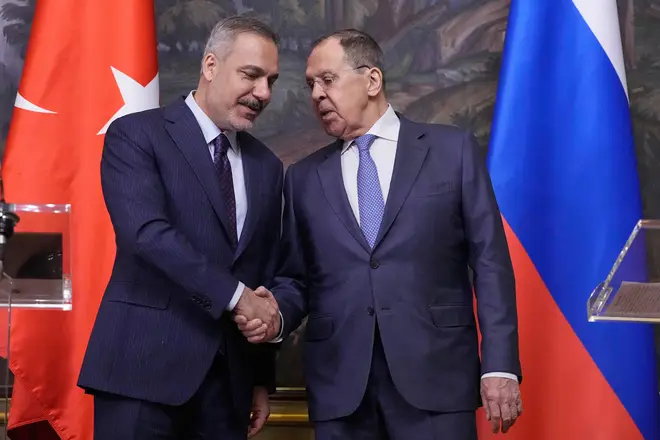The second round of talks between Ukraine and Russia may take place next Monday in Istanbul, Russian Foreign Minister Sergey Lavrov said.
According to Lavrov, Russia has drafted a memorandum on the terms of a peaceful settlement, “which sets out our position on all aspects of reliably overcoming the root causes of the crisis.”
“Our delegation, led by V.R. Medinsky, is ready to present this memorandum to the Ukrainian delegation and provide the necessary explanations during the second round of resumed direct talks in Istanbul next Monday, June 2,” his statement posted on the Foreign Ministry’s website said. Lavrov said that the Russian side expresses its gratitude to Turkey for providing a “welcoming Turkish venue.”
“We hope that all those who are sincerely, and not just in words, interested in the success of the peace process will support the holding of a new round of direct Russian-Ukrainian talks in Istanbul,” Lavrov concluded.
Istanbul as the main venue for talks between Russia and Ukraine
“Istanbul is becoming the main venue for negotiations on all issues related to the Black Sea, the Black Sea deal, the grain deal, and now the Russian-Ukrainian negotiations,” secretary of Russia’s Security Council Sergei Shoigu said at a meeting with Turkish National Security Council Secretary Okan Memiş.
The Russian Security Council secretary thanked the Turkish leadership for providing the Istanbul platform for Russian-Ukrainian talks. “We know that Ankara has made considerable efforts, including in terms of security, to create optimal conditions for the work of the delegations,” Shoigu said.
Why Turkey?
Earlier, Reuters reported that the UAE, Saudi Arabia, Qatar and Oman were also being considered as potential venues for the talks. According to Kristian Ulrichsen, a Middle East expert at Rice University, Turkey meets three criteria.
First, it is friendly to Russia, so it has the ability to communicate with all sides of the conflict without bias. Second, Turkey is becoming an increasingly prominent player on the international stage. And thirdly, it has experience as a mediator in various conflicts.
Expectations of the sides
Reuters, citing informed sources, reported that in addition to Ukraine’s neutral status in the memorandum, Russia will demand the following: the lifting of anti-Russian sanctions, a resolution of the issue of frozen Russian assets, and guarantees for the protection of the Russian-speaking population.
One of Reuters’ interlocutors noted that Russian president Vladimir Putin is ready for agreements, “but not at any price.” This statement underscores the Kremlin’s position that Russia is not willing to make compromises that could threaten its national interests.
Kremlin spokesperson Dmitry Peskov declined to comment on the details of possible agreements, stressing that Russia does not yet intend to publicly discuss the content of the negotiations.
Meanwhile, Ukrainian president Volodymyr Zelensky called on US and EU donors to allocate another $30 billion from frozen Russian assets to Ukraine by the end of the year to “stimulate domestic arms production.”
Trump and the negotiations
After a telephone conversation with Vladimir Putin on May 19, Trump seemed to be sympathetic to Russia’s demands in the negotiations. He spoke respectfully of Putin — unlike Zelensky, from who he “always expected problems.”
However, in recent days, Trump’s rhetoric has changed. Trump made harsh statements against Putin, promising to impose further “hellish sanctions.”
On Thursday, Donald Trump said he was giving Russia and Ukraine two weeks to come up with a peace deal, after which he would draw his “conclusions.”
Timeline of talks
On May 16, the first direct talks between Moscow and Kyiv in three years took place in Istanbul. Putin initiated the resumption of talks. The Russian delegation was led by his aide Vladimir Medinsky, and the Ukrainian delegation by Defence Minister Rustem Umerov.
The talks lasted about two hours and ended with several agreements: on the exchange of prisoners of war on a “1,000 for 1,000” basis, the presentation of plans for a ceasefire and a basic agreement on a new meeting.
On May 23-25, Russia and Ukraine exchanged prisoners. On the first day, the sides handed over 270 military personnel and 120 civilians to each other, on the second day 307 military personnel, and on the third day 303 military personnel. This exchange was the largest since the start of hostilities in 2022.
On May 27, Kyiv announced that it had already handed over to Washington its draft memorandum with the terms of a peaceful settlement. According to the Ukrainian president’s office, the memorandum provides for an unconditional ceasefire, giving “an opportunity to sit down at the negotiating table” to determine the remaining stages of the settlement. At the same time, Kyiv considers the legal recognition of Crimea, the DPR (Donetsk region), the LPR (Luhansk region), and the Zaporizhzhia and Kherson regions as part of Russia unacceptable.
On May 28, Peskov said that the preparation of the Russian version of the memorandum was in its final stages and that the document would soon be ready.
